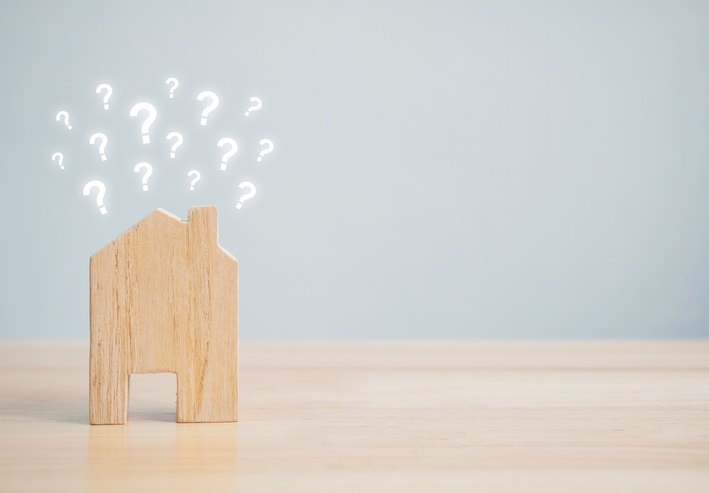Choosing the type of home loan mortgage is one of the most important decisions a home buyer can make. But with so many different types and requirements, it can be tough to decide which is the right one or even which ones to ask about. It’s important to work out the details with the mortgage lender, but it helps to understand mortgage basics before the first appointment.

How Interest Rates Are Determined
How a mortgage’s interest rate works depends on the type chosen. All loans will have either a fixed rate, an adjustable rate, or a hybrid system. Each of these interest rate structures has a unique set of advantages and disadvantages that potential buyers will need to consider.
Fixed-Rate Mortgage Loans
Fixed-rate mortgages have a consistent interest rate throughout the life of the loan, which can last for 20 years or more. The payment versus interest ratio will fluctuate between payments, but the payment amount will stay the same for the duration of the term. It’s this consistency and dependability that make fixed mortgages a favorite for first-time home buyers and people who plan to live in the home for a long time.
Adjustable-Rate Mortgage Loans
As its name suggests, an adjustable-rate loan has an interest rate that fluctuates over a term. This feature makes it the preferred mortgage type for home buyers who want to save money. However, the savings depend on interest rate trends and how long the owner plans to stay. While they are somewhat unpredictable, the risk is limited to some degree. Pre-set limits dictate how much a loan can change each month and throughout a mortgage term.
Hybrid Mortgages
Some mortgage lenders offer home loans with a combination of fixed and adjustable rates. Called hybrid mortgages, they have a period of fixed rates with interest that’s often lower than traditional fixed-rate mortgages. Once the fixed period ends, the interest fluctuates every year afterward. For those who plan to resell the home before the initial fixed period ends, this could mean significant savings.
How the Funds Are Backed
Mortgages need to be insured or backed to protect lenders from financial losses. There are two systems in place to accomplish this goal. Conventional mortgages depend on the financial system. Government-insured mortgages, however, are structured and backed by the federal government.
Conventional Home Loan Mortgages
Unlike FHA, VA, and USDA home mortgages, conventional loans aren’t backed by the government. Instead, they’re often included in mortgage-backed securities. Previously, this mortgage type was common because they were frequently available with no verification or down payment. In fact, this loan type makes up more than half of all current mortgages in the United States. Today, however, it’s a different story.
Conventional mortgages include a full range of checks and applications. To qualify, buyers need to pass background checks, asset and liability verifications, credit history checks, and typically have a credit score of at least 650. These mortgage types will often have higher interest rates, which are determined by the markets and the applicant’s financial profile. To offset the higher rates, home buyers can buy discounts through lender fees called points. The more points a home buyer buys, the lower the interest rate will be.
FHA Home Loans
FHA loans are one type of government-insured mortgages. Available to anyone, these loans are an excellent choice for first-time home buyers. The low down payment associated with FHA mortgages, makes it possible for low-income households to purchase a home. However, these loans require mortgage insurance, which does increase monthly payments.
VA Home Mortgage Loans
VA home loans are fully government-insured mortgages through the U.S. Department of Veterans Affairs. Because they are guaranteed by the federal government, these mortgages require no down payment. There is an upfront funding fee, that can be rolled into the loan, but there is no mortgage insurance tacked on to the monthly payment. This makes them the ideal choice for former veterans who qualify.
USDA (RHS) Home Loan Mortgages
USDA mortgages are made through the United States Department of Agriculture’s Rural Housing Service (RHS) and are 90 percent government insured. They’re designed to make home ownership available for low-income households in rural areas, who fail to secure other financing options. And they are often chosen for their low down payment requirements and flexibility. These home loans can be used for refurbishing existing homes, buying a house, or new home construction. They also cover fees, disability equipment, energy efficient upgrades, and major household items.
203(K) Rehab Mortgages
Available as a fixed or adjustable rate mortgage, the 203(K) mortgage is available through the FHA. They’re designed specifically to help home buyers purchase properties that require renovations of at least $5,000. This includes properties that will be converted into a home or separate units. However, once the renovations are complete, the property will need to meet structural and energy efficiency standards. There are also requirements for how repairs are completed.
The Mortgage Size
The size of a mortgage will determine which category it falls under. Conforming mortgage limits and criteria are defined by Fannie Mae and Freddie Mac. Jumbo home loans, however, are for amounts above the limit defined by the government corporations.
Conforming Mortgage Loans
When a mortgage has been described as a conforming loan, it means the loan falls under the criteria set by Fannie Mae and Freddie Mac. These corporations purchase loans from mortgage lenders. Then, they buy and sell them using a financial tool known as mortgage-backed securities.
Jumbo Home Mortgage Loans
Mortgages that exceed Fannie and Freddie limits are referred to as jumbo mortgage loans. Due to the high dollar amounts and equally high risks, these loans often have high interest rates and require large down payments. Also, they can be difficult to get. These mortgages can only be secured by home buyers with superior financial profiles.
The type of mortgage a home buyer gets will determine how affordable the payments will be. Therefore, it’s important to consider the many options carefully. My goal as a real estate agent is to provide you with comfort and reliability, while helping you discover a great home that fits your needs. My team and I can help you navigate questions you may have on mortgages and which may be the best options for you. Get in touch today!
Photo credit: Getty images/Witthaya Prasongsin



 Should I Stay or Should I Go? Was “The Clash” singing about your home??? Now get that song out of your head, and if you’re under 30, just disregard. And before you go on an 80’s YouTube music video bender, focus and finish reading this helpful article first! 🙂
Should I Stay or Should I Go? Was “The Clash” singing about your home??? Now get that song out of your head, and if you’re under 30, just disregard. And before you go on an 80’s YouTube music video bender, focus and finish reading this helpful article first! 🙂 
 quickly, if they haven’t researched closing costs. Property fees are just the beginning. Loans, insurance, taxes and title, and everything else associated with buying a home will have additional charges. Each one seems minimal, but together they can quickly add upwards to 5 percent of a home’s price to the final total.
quickly, if they haven’t researched closing costs. Property fees are just the beginning. Loans, insurance, taxes and title, and everything else associated with buying a home will have additional charges. Each one seems minimal, but together they can quickly add upwards to 5 percent of a home’s price to the final total.